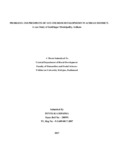Please use this identifier to cite or link to this item:
https://elibrary.tucl.edu.np/handle/123456789/2332| Title: | Problems and Prospects of Eco-Tourism Developmemt in Achham District |
| Other Titles: | A case Study of Sanfebagar Municipality, Achham |
| Authors: | Khadka, Devi Kala |
| Keywords: | Ecotourism;Tourism development;Tourist |
| Issue Date: | 2017 |
| Publisher: | Central Department of Rural Development Tribhuvan University, Kathmandu |
| Abstract: | The thesis entitled Problem and Prospect of Ecotourism Development: A Case Study of Sanfebagar Municipality, Achham District, Nepal has been prepared for the fulfillment of Master Degree in Rural Development from the Central Department of Rural Development, T.U., Kirtipur. It is entirely based on the field survey in which researcher has exercised to highlight the eco-tourism is natural environment and cultural richness. Eco-tourism is a new concept in the tourism sector and operations have been established all over the world particularly in developing countries on the assumption of poverty alleviation and environment conservation as well as minimum impact in environment sector. The general objective of the study is to identify the problems and possibilities of eco-tourism Development of Baidhyanath in Achham District and has been used the random sampling methods in selected areas of Baidhyanath. The primary data are collected using questionnaire through the field survey in the study area and secondary data from various sources. Based on the study, it is found that Baidhyanath is located in Achham district. It is natural beauty and socio-cultural life style with untouched by modern onslaughts, with famous religious Temple Baidhyanath, wetlands, pasturelands, river and so many things which are potential for tourist destination. This place is famous for both domestic and international tourism for its peculiar village environment. In the view of its potential for the tourism development, local community is seen to the more interested and aware on the development on this area jointly as tourist destination. The study identifies tremendous prospects of eco-tourism and problems. Baidhyanath Temple, Tapti Kunda, Kailash Khola, Budhiganga River, Lungarli Khola, Kalika Devi Temple, Devithum Tample, Sanfebagar, Khapad, Ramaroshan, fauna-flora, scene view, historical movement local culture, mountain scene and favorable climate are the attractions of Achham. Similarly, the problems are found mainly about the drinking water, trained manpower, health and sanitation problem, lack of recreational facilities, lack of good qualities hotels, public toilet, peace and security and lack of marketing etc. There is absence of well, electricity, sanitation, marketing medical facilities, recreational center, visitor information center and entry of which are the vital challenging problems. Tourism has created employment opportunities to the local people and most of them have got indirect benefit. Households along the trekking route and destination derive economic benefits through sale of local products like vegetables, milk, ghee; eggs etc. for the hotels the development of tourism would promote village and hotel industry as well as agriculture and livestock farming also flourish due to the development of tourism. .There are major trekking routes; Baidhyanath to Devithum for 3 hours long trek, Baidhyanath to Kailash for an hour long trek, Sanfebagar to Khaptad for 9 hours long trek. The best of time to visit the area is from January to March. The research has been conducted on the basis of field survey applying exploratory cum descriptive in which 60 locals, 6 hotels, 20 tourists key informants have been taken as sample and applied interview, timeline and table as tools. Hence, the future of eco-tourism development in Baidhyanath area is found to be very optimistic and relies heavily on who is responsible for marketing, eco-tourism, planning, modifying entry fee, establishing infrastructure, making aware to locals and tourists regarding to eco-tourism in the study area (Baidhyanath area). Apart from this, eco-tourism provides a high level of education on ecology and environment, which has positive impact upon the protection of environment and culture and brings about economic benefits for the host communities and contributes to conservation activities efforts. |
| URI: | http://elibrary.tucl.edu.np/handle/123456789/2332 |
| Appears in Collections: | Rural Development |
Items in DSpace are protected by copyright, with all rights reserved, unless otherwise indicated.

